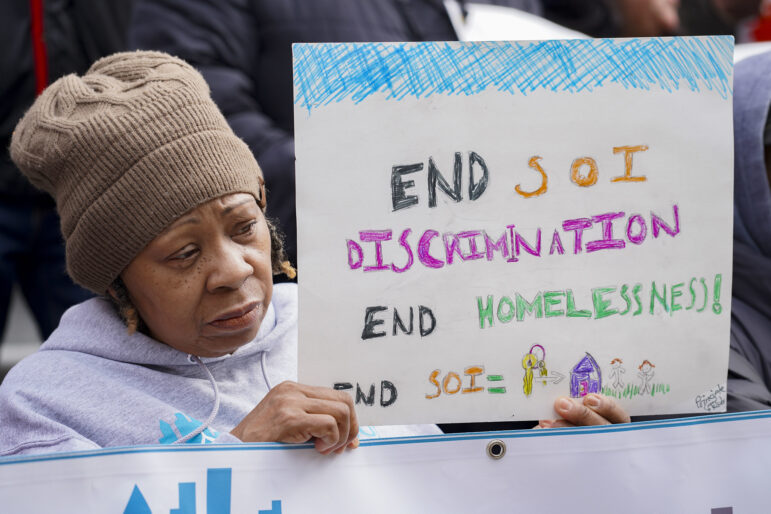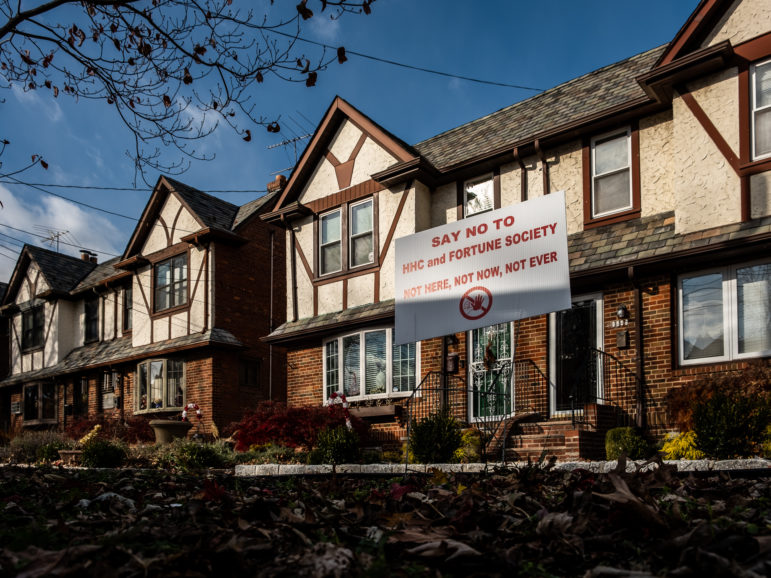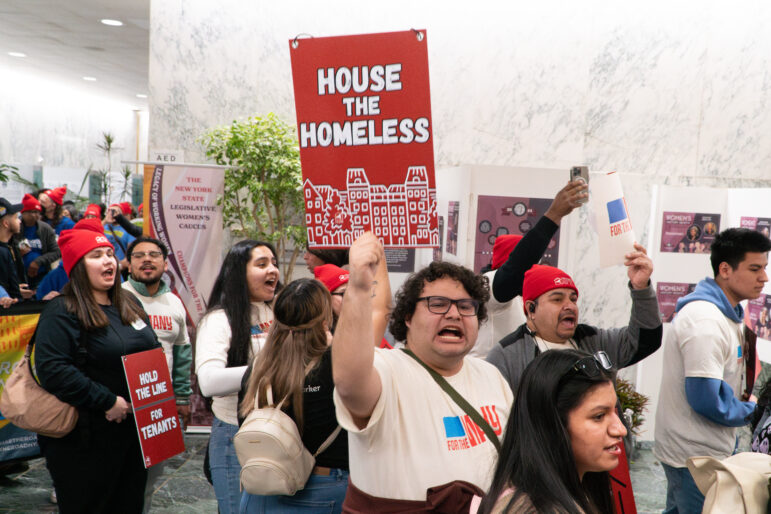
Photo by: Marc Fader
When Rep. Gregory Meeks’ Far Rockaway office was shut down by a power outage after Hurricane Sandy, his district staff ran another office, in Jamaica, 24 hours a day to deal with constituents post-storm needs.
When Hurricane Sandy struck last week, three members of New York City’s congressional delegation and their aides felt the effects directly. Rep. Michael Grimm’s office on New Dorp Lane in Staten Island, Congressman Gregory Meeks’ Far Rockaways satellite and Rep. Jerrold Nadler’s Brooklyn location, just a few blocks from the Coney Island shoreline, all lost power.
So Grimm’s staff set up a makeshift office in a nearby Hilton hotel. Meeks kept his other office, in Jamaica, open 24 hours a day. Nadler took to Twitter with pictures of devastation, calls for volunteers and tips for constituents on where FEMA assistance.
Sandy and her impact may soon engage members of Congress in weighty debates about recovery funding and sea defenses; Nadler has already been on the air to discuss the potential need for retractable seawalls to protect New York against future storm surges. But for now, local members are dealing with the nitty gritty of the storm. Grimm on Sunday brought would-be marathon runners to volunteer in Crescent Beach. Meeks’ office has been handling complaints about power outages and fallen trees. Nadler directed residents to sites for getting free food and water. Staff for Rep. Joe Crowley, who represents parts of the East Bronx that took damage from the storm, guided constituents through the process of getting disaster assistance. Rep. Charles Rangel’s office in Harlem publicized a list of resources for businesses hurt by Sandy.
Members of Congress always operate in two theaters?the corridors of power in the nation’s capital and the streets of their districts. So when assessing the effectiveness of New York City’s House delegation, each member’s role in substantive legislation or multi-billion-dollar budgeting is only part of the picture. Be it after a devastating hurricane or under more normal circumstances, their impact on local groups and individual constituents is a more mundane but critical part of their jobs. For his part, Crowley says helping constituents is “my number-one priority as a member of Congress.”
Inquiries run the gamut
New York City’s 13-member Congressional delegation operates a total of 24 district offices in the city. (Rep. Eliot Engel currently has two additional offices in Westchester and Rockland counties.) Some of those offices will close or re-locate once new district lines take hold. Now that Co-op City, in the Bronx, is shifting into Engel’s territory, Crowley’s office there will close down. Rep. Carolyn Maloney’s Astoria office and Nadler’s Coney Island satellite will move to reflect shifting boundaries.
Brice Peyre, Maloney’s longtime spokesman, says her district offices receive hundreds of inquiries per week?in line with estimates from other House members in the city. Rangel’s office received 52,000 phone calls last year, and while some of those were from people calling in to express an opinion on some policy topic, many were people with questions about immigration, Social Security or energy assistance. According to a Rangel spokeswoman, “Constituent service is our top priority and every single member of the staff deal with constituent issues.”
Sometimes the inquiries can be addressed by answering a simple question; on other occasions the issue is more complex. Peyre recalls one constituent issue that took 10 years to resolve. Rob Gottheim, the district director for Nadler, says his office was contacted last year by a Chinese family having visa trouble: One brother was dying and in desperate need of a stem-cell transplant from his twin, who was being blocked from traveling to the United States; a call from Nadler to the consulate cleared the way. The brother passed away in spite of the transplant.
Usually, the stakes are lower. Crowley says he gets calls about “recommending one of my young constituents for entry into our nation’s top academies.” Nadler is often contacted on matters than have nothing to do with federal policy per se, like problems with a MetroCard, but Gottheim says the staff tries to help anyway. Peyre says Maloney’s office is seeing more inquiries these days from same-sex couples with immigration problems.
“Sometimes they feel like they’re in a Catch-22,” says Gottheim of the callers. “They can never speak to somebody, and the beauty of an elected official is we can talk to a real, live person and get that information and pass it along.”
Members of Congress work through special liaison offices at federal agencies and get straight answers that aren’t available to the public. That’s true even if a Democratic member of Congress is trying to get help from a Republican administration, or vice versa, according to Engel spokesman Joe O’Brien. “The level we work at is governed by the law,” not politics, he added.
As O’Brien spoke on a recent morning, a staffer across the office hung up his phone and turned to the elderly man seated near his desk. “I just talked to him and he says hold off. Hold off because you’re already getting the maximum benefit,” the staffer said. “Do you understand? You’re not going to get any more money.”
Visibility varies
Engel’s office on Johnson Avenue, with its green awning bearing Engel’s name, is among the more visible Congressional offices in the city. Rep. Jose Serrano’s lone district office is tucked into a back hallway of the top floor of the historic Bank Note Building in Mott Haven; passersby would never know there was a Congressional presence in the structure.
In front of the building that houses Rep. Yvette Clarke’s Linden Boulevard office, there’s a huge sign for Councilman Mathieu Eugene, who also has space inside, but none for the congresswoman. On a sunny October weekday, an elderly woman came to Clarke with a housing problem. “You’re hurting my heart. My heart’s hurting,” a receptionist told the woman, who had been evicted. It soon became clear this wasn’t the first time they’d spoken. A few months ago, the staffer gently reminded the woman, “I told you I’d found a place for you, but you didn’t want it.”
Members of Congress have to decide how to spend the funding they get each year for staff and offices, and that means compromises. Nadler’s office on Varick Street is inside a large federal building with no street visibility?not ideal, says Gottheim, but what they can afford.
“We need to be in Manhattan. We need to have the space to work in Manhattan. Manhattan has very expensive office rates,” Gottheim explains, adding that Nadler will probably shift his Coney Island office to Bensonhurst, and ably most likely to a store-front operation, if he wins the fall election. (Every city House member who’s seeking a return to Washington faces opposition on Nov. 6. Click here to see the options for voters.)
Rangel’s district recently expanded to include a chunk of the Bronx. It’s unclear whether the congressman will open an office there. “In the coming months we will be assessing the best way to allocate our office resources as there may be an 8 percent cut in the office budget next year as a result of the fiscal cliff,” says the Rangel spokesman.
One of the city’s two Republican members, Grimm, has perhaps the most visible office, identifiable down New Dorp Lane by a large sign on the building’s exterior wall. (There’s also a green elevator.) But when it comes to another aspect of district work?responding to local groups?Grimm comes in for some criticism.
“We’ve not been successful in having a face to face meeting with him at all,” says Nina Valmonte, director of parish and community outreach for Catholic Charities if Brooklyn and Queens, which sought meetings with all members of the city delegation as part of its advocacy for the low-income nutrition sections of a new farm bill. In contrast, when the organization began advocating for a law streamline cumbersome rules for federal benefits programs, “Clarke and Velazquez both offered to cosponsor it right from the start.”
Local groups give mixed reviews
Grimm, who also has a Bay Ridge location, has only been in office since January 2011. The city’s longest-serving House member, Rangel, also gets mixed reviews from local advocates. Sandra Killett, a Harlem resident and member of the advocacy group Community Voices Heard, recalls a meeting with Rangel in Washington a few years back concerning workfare. “He didn’t seem to have the time of day to listen even to the stories of the individuals about what was happening,” she says. “He has not been responsive.”
Glenn Martin, a vice president at the Fortune Society, which assists people emerging from prison, sees it differently. “Every year [Rangel] introduces bills in Congress that relate to people who’ve been involved in the criminal justice system?namely a bill that works to restore voting rights,” he says. Rangel also recently secured an earmark for the Fortune Society that allowed it to produce a toolkit on housing people who’ve been incarcerated and an advocacy campaign for hiring ex-inmates. The society meets face-to-face with Rangel at least once a year, and its staff makes a point of attending events Rangel sponsors. “There something to be said for meeting people where they are.”
Given that most of the city’s delegation is Democratic and, for the most part, notably liberal, it might seem odd that advocacy groups need to lobby local reps on child nutrition, criminal justice or welfare. But Killett feels it’s crucial that House members understand the human side of the issues they legislate. And Velmonte says the contacts also give advocates a realistic sense of what’s possible in Washington. “Often what we’ll get is, ‘We support you and we know this is important but you have to understand what we’re up against,’ ” she says. Other times, the reaction is, “‘As much as we support this, we can’t fight for this … because of the other things that we’ll lose.’”
While face time with a House member is ideal, contacts with key staff also help. Advocates “get to know the local staffers and they get to have more meaningful relationships with those people because they’re right here,” says Shana Mosher, an analyst at the Human Services Council who has coordinated workshops aimed at stopping cuts to the federal Community Services Block Grant program; House members and U.S. Senators have attended past sessions or sent staff.
An outpost
Meeks’ Rockaways office is barely a mile from the Atlantic Ocean and even closer to the Nassau County border, across from a half-empty strip mall in a beat-up section of the neighborhood. Even when the power is on, it’s only open three days a week. But in an era when the role of the government in people’s lives is vigorously debated, it’s a link between a neglected New York City neighborhood and federal power.
On an afternoon a couple weeks before Sandy struck, at Meeks’ other office in Jamaica, five of the dozen seats in the waiting room were filled. “One of the reasons why people are coming to our office is because their houses are being foreclosed on,” said Candace Sandy, Meeks’ spokesperson. “They’re embarrassed, angry, and they wait until so late that we’re scrambling to fix things. “
A few minutes later a young black woman emerged from the office. “I went because I’m out of work,” she said. “They said they’d send my resume around. It’s a service they provide. They said they couldn’t promise anything. But they helped.”
This story was produced in a reporting partnership with NYWorld.
Irina Ivanova contributed reporting.









